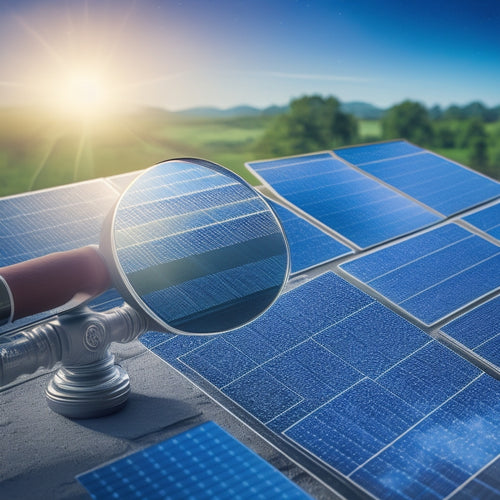
Why Are Homeowners Switching to Solar Energy
Share
You're likely considering switching to solar energy because rising electricity costs, environmental concerns, and government incentives have made it a more attractive option than ever. With traditional energy sources driving up electricity bills, you're seeking ways to reduce your expenses and carbon footprint. Solar energy offers a cleaner, more sustainable alternative, allowing you to generate your own power and decrease your reliance on the grid. Plus, government incentives, increased property value, and low maintenance requirements make the switch even more appealing. As you weigh your options, you'll want to investigate the details of how solar energy can benefit your wallet and the environment.
Key Takeaways
- Rising electricity costs and inflation are driving homeowners to switch to solar energy, which can reduce electricity bills by up to 50%.
- Homeowners are switching to solar energy due to growing environmental concerns, including climate change and carbon emissions from fossil fuels.
- Government incentives, such as federal tax credits and state rebates, are making solar energy more affordable and accessible to homeowners.
- Solar energy provides homeowners with control over their energy costs and promotes energy independence, reducing reliance on the grid.
- With low maintenance requirements and increased property value, solar energy is a sustainable and cost-effective option for homeowners.
Rising Electricity Costs
As you've likely noticed, your electricity bills have been steadily increasing over the years, and you're not alone. This upward trend is a result of various factors, including rising fuel costs, infrastructure upgrades, and inflation.
The impact on your wallet can be substantial, making it vital to reassess your budget planning strategies.
To mitigate the effects of rising electricity costs, it's important to investigate alternative energy sources that can provide significant electricity savings. One such option is solar energy, which has become increasingly cost-competitive with traditional power sources.
By investing in solar panels, you can reduce your reliance on the grid and lower your electricity bills. In fact, solar energy can save you up to 50% on your electricity costs, depending on your location and energy usage.
Environmental Concerns Grow
As you consider switching to solar energy, you're likely motivated by growing concerns about the environmental impact of traditional energy sources.
You're aware that rising carbon emissions are accelerating climate change, and you're not alone in recognizing the urgent need for a sustainable solution.
Rising Carbon Emissions
Carbon footprint anxiety grips the globe as the unyielding surge in carbon emissions threatens to destabilize the planet's delicate ecological balance. You're likely aware that your daily habits contribute to this issue, and it's a major concern.
The truth is, traditional energy sources like fossil fuels are major contributors to rising carbon emissions. These emissions come from various sources, including power plants, transportation, and industrial processes. As a result, your carbon footprint grows with every energy-consuming activity.
However, you have the power to make a change. By switching to solar energy, you'll greatly reduce your reliance on fossil fuels and lower your carbon footprint.
Renewable resources like solar power offer a cleaner, more sustainable alternative to traditional energy sources. You'll not only reduce your environmental impact but also enjoy lower energy bills and potential tax incentives.
It's time to take control of your energy consumption and make a positive impact on the planet.
Climate Change Impact
Through the lens of climate change, the consequences of rising carbon emissions come into sharp focus.
You're likely aware of the devastating impact of climate change on our planet, from intense hurricanes to droughts and wildfires. The reality is that our reliance on fossil fuels is a significant contributor to this crisis. As a homeowner, you have the power to make a difference by switching to solar energy.
Here are just a few reasons why climate action is essential:
-
Rising global temperatures are melting polar ice caps, causing sea levels to rise and threatening coastal communities.
-
Extreme weather events, such as heatwaves and storms, are becoming more frequent and intense, putting human lives at risk.
-
Climate change is disrupting ecosystems, leading to the loss of biodiversity and extinction of species.
- The World Health Organization estimates that climate change is responsible for thousands of deaths annually, mainly due to air pollution.
Government Incentives Abound
Your local government is likely offering a helping hand to make the switch to solar energy more affordable. From federal tax credits to state rebates, there are numerous incentives available to homeowners who decide to go solar. These incentives not only reduce the upfront cost of solar panel installation but also provide long-term savings through energy tax breaks.
| Incentive Type | Benefit | Eligibility |
|---|---|---|
| Federal Tax Credits | 26% of total installation cost | All homeowners who install solar panels |
| State Rebates | Varies by state, up to $10,000 | Homeowners who install solar panels in participating states |
| Solar Grants | Up to $20,000 | Low-income homeowners and non-profit organizations |
In addition to these incentives, many states have implemented renewable energy policies that promote solar adoption. Homeowner education and installation incentives are also available to guarantee a smooth changeover to solar energy. Moreover, solar financing options have become more accessible, making it easier for homeowners to afford the initial investment. By taking advantage of these government incentives, you can greatly reduce the cost of switching to solar energy and start enjoying the benefits of clean, renewable power.
Energy Independence Matters
By switching to solar energy, you'll gain power over your electricity bills, reducing your reliance on the grid and allowing you to be energy self-sufficient.
This means you'll have more control over your energy costs and usage, freeing you from the uncertainty of rising utility rates.
With solar energy, you'll be generating your own clean power, making you less dependent on external energy sources.
Power Over Your Bills
With energy costs constantly on the rise, taking control of your expenses is more crucial than ever.
As a homeowner, you're likely tired of watching your hard-earned money disappear into thin air. By switching to solar energy, you'll gain power over your bills and start building a more sustainable financial future.
Here are just a few benefits you can expect:
-
Cost Savings: Solar energy can markedly reduce your energy bills, freeing up more money in your budget for the things that matter most.
-
Energy Autonomy: With solar panels installed on your roof, you'll be generating your own clean energy and reducing your reliance on the grid.
-
Predictable Energy Costs: Say goodbye to surprise rate hikes and hello to predictable energy costs that fit your budget.
- Increased Property Value: Installing solar panels can increase your property value, making your home more attractive to potential buyers if you decide to sell in the future.
Reduce Reliance on Grid
As the world shifts towards a more sustainable future, energy independence matters more than ever. By reducing your reliance on the grid, you're taking a significant step towards achieving it.
You'll be less dependent on an aging infrastructure prone to outages and disruptions. Solar energy allows you to generate your own power, reducing your reliance on the grid and enhancing grid resilience.
When you produce your own energy, you're not only reducing your energy bills but also contributing to energy diversification. This means you'll be less affected by price fluctuations and supply chain disruptions.
With solar energy, you'll have more control over your energy usage and be better equipped to manage your energy costs.
Be Energy Self-Sufficient
Energy autonomy is within your grasp when you switch to solar energy. You'll no longer be at the mercy of your utility company, with its fluctuating rates and unpredictable outages. Instead, you'll be in control of your energy usage, generating your own power and storing it for later use.
By going solar, you'll achieve true energy independence. Here's what that means for you:
-
Uninterrupted power supply: With energy storage, you'll have a backup plan during grid outages, ensuring your lights stay on and your appliances keep running.
-
Sustainable living: Solar energy is a clean, renewable resource, reducing your carbon footprint and contributing to a healthier environment.
-
Lower energy costs: By generating your own energy, you'll greatly reduce your reliance on the grid, saving you money on your utility bills.
- Increased property value: Installing solar panels can enhance your property's value, making it more attractive to potential buyers if you decide to sell in the future.
With solar energy, you'll be living life on your own terms, free from the constraints of the grid.
Low Maintenance Required
Solar panel systems are designed to be self-sufficient, and you'll find that your new setup requires very little upkeep. This is because solar panels are built to last, with a typical lifespan of 25 years or more. Their durability guarantees that they can withstand various environmental conditions, including extreme temperatures, humidity, and weather events.
As a result, you'll enjoy significant maintenance savings over the years.
In addition, solar panels have no moving parts, which means they're less prone to mechanical failures. This reduces the likelihood of costly repairs and replacements.
The only maintenance task you'll need to perform is cleaning the panels periodically to maintain peak energy production. Even this task can be automated with the use of specialized cleaning systems.
Increased Property Value
Your investment in a solar panel system pays off in more ways than one, with a significant increase to your property's value being a notable perk.
This enhancement in value is backed by data, with a study by the National Renewable Energy Laboratory finding that solar panels can increase your property's value by up to $15,000.
Here are some key factors that contribute to this increase in property value:
-
A property appraisal will reflect the added value of your solar panel system, making your property more attractive to potential buyers if you decide to sell.
-
Solar panels are a highly sought-after feature in today's market, with many homebuyers willing to pay a premium for properties with existing solar installations.
-
As market trends continue to shift towards sustainable living and renewable energy, the value of solar-equipped properties is likely to increase even further.
- By installing solar panels, you're not only increasing your property's value but also contributing to a reduction in greenhouse gas emissions and a cleaner environment.
Solar Panels Get Efficient
Efficiency advancements have propelled the solar industry forward, allowing homeowners to reap even more benefits from their investment. You're now able to generate more power from the same amount of sunlight, making solar energy an even more attractive option.
| Year | Efficiency Rate | Power Output |
|---|---|---|
| 2005 | 12% | 150W |
| 2015 | 18% | 250W |
| 2022 | 22% | 350W |
Solar technology advancements have led to significant improvements in panel efficiency. For instance, the average efficiency rate has increased from 12% in 2005 to 22% in 2022. This means you can now generate 350W of power from the same surface area that would've produced only 150W in 2005. In addition, panel lifespan improvements have also extended the average lifespan of solar panels from 25 to 30 years or more. This increased efficiency and longer lifespan translate to more savings on your electricity bill and a faster return on your investment.
Zero Carbon Footprint Goal
Achieving a zero carbon footprint has become a pressing concern for environmentally conscious homeowners, driving the demand for renewable energy sources like solar power.
You're likely no exception, and that's why you're considering switching to solar energy. As you aim for sustainable living, reducing your reliance on fossil fuels is vital. Renewable resources like solar power offer a clean and efficient alternative.
Here are some key benefits of achieving a zero carbon footprint with solar energy:
-
Reduced greenhouse gas emissions: Solar power generates electricity without burning fossil fuels, minimizing your carbon footprint and contributing to a cleaner environment.
-
Lower energy bills: Solar panels can greatly reduce your energy expenses, saving you money in the long run.
-
Increased property value: Installing solar panels can enhance your property's value, making it more attractive to potential buyers if you decide to sell in the future.
- Government incentives: You may be eligible for tax credits, rebates, or other incentives for switching to solar energy, which can help offset the initial investment costs.
Frequently Asked Questions
Can I Install Solar Panels on My Roof if It's Old or Damaged?
You'll need a roof assessment to determine if your old or damaged roof can support solar panels. Depending on the results, you may have installation options like reinforcing your roof or exploring alternative mounting systems.
How Long Does It Take to Recoup the Cost of Solar Panel Installation?
You're wondering when you'll break even on your solar investment. The wait isn't long! With significant cost savings and attractive installation incentives, you can recoup the cost of solar panel installation in as little as 5-7 years, depending on your location and energy usage.
Do Solar Panels Work During Power Outages or at Night?
You wonder if solar panels work during power outages or at night; the answer is no, unless you have battery storage, which stores excess energy generated during the day for later use, maximizing net metering benefits.
Are Solar Panels Resistant to Extreme Weather Conditions Like Hail?
You're wondering if solar panels can withstand harsh weather? Yes, they're designed to be highly resistant to extreme conditions, including hail damage, thanks to their weather durability features, ensuring peak performance even in the toughest climates.
Can I Use Solar Energy to Power My Electric Vehicle?
You're fueling up for the future, and solar energy is the pit stop. Yes, you can use solar charging to power your electric vehicle, seamlessly integrating it into your home's energy system, giving you the freedom to drive on sunshine.
Related Posts
-

Why Higher Upfront Costs Are Worth It
You pay a premium for high-quality, energy-efficient products, but they're worth it. With durability testing ensuring...
-

Solar Panel System Certification Costs: A 10-Point Breakdown
You're looking to understand the costs associated with solar panel system certification. Your total certification cos...
-

Planning for an Electric Vehicle-Friendly Urban Future
As you plan for an electric vehicle-friendly urban future, you'll need to integrate high-power charging stations, sma...


